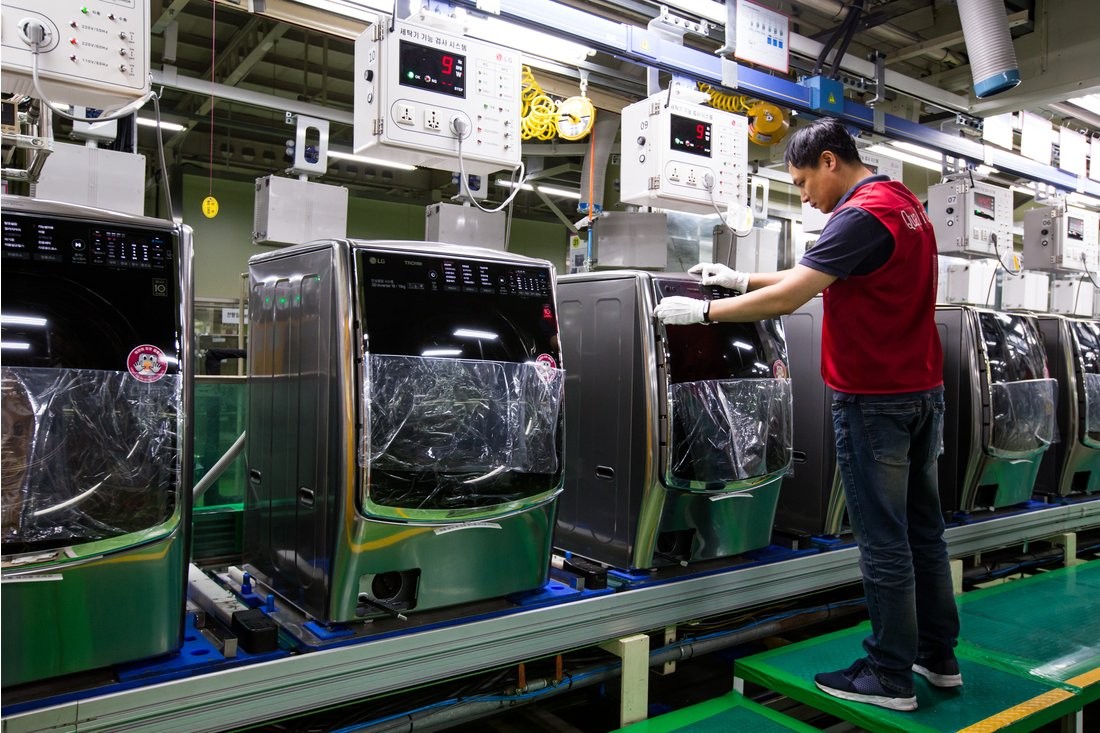特朗普關(guān)稅新政:不會促進就業(yè),,只會加速美國衰退
|
美國總統(tǒng)特朗普已經(jīng)決定對進口鋼材和鋁材加征關(guān)稅了,這也標志著特朗普鐵了心要開貿(mào)易保護主義的倒車,。據(jù)《紐約時報》報道,,這似乎也是特朗普首席經(jīng)濟顧問加里·寇恩本周宣布辭職的原因。 特朗普稱,,加征關(guān)稅的目的是為了促進國內(nèi)就業(yè),。批評人士則指出,,因關(guān)稅而毀掉的工作,將會比關(guān)稅帶來的工作還多,。 兩方的看法其實都不全面,。關(guān)稅不會改變美國就業(yè)市場的工作總量,它只會改變改變就業(yè)市場的結(jié)構(gòu),,同時使我們變得更窮,,經(jīng)濟效率更低下。 經(jīng)典學(xué)派的自由貿(mào)易論者認為,,當(dāng)人們可以自由進行跨國貿(mào)易時,,各國生產(chǎn)者會根據(jù)自身專長,生產(chǎn)對其來說最高效的產(chǎn)品,。美國的鋼鐵產(chǎn)量在過去十年間下降了近20%,,而進口鋼材和鋁材的數(shù)量相應(yīng)增加,這表明美國資本和工人在其他行業(yè)獲得了更好的就業(yè)和運用,。 從總數(shù)看,貿(mào)易并不會帶來工作,,也不會毀掉工作,,因為從鋼鐵或鋁材行業(yè)的就業(yè)流失數(shù),必然會被美國出口行業(yè)以及使用鋼材,、鋁材生產(chǎn)產(chǎn)品的其他行業(yè)的就業(yè)增加數(shù)所抵消,。同理,關(guān)稅為鋼鐵和鋁材行業(yè)創(chuàng)造的就業(yè)增加數(shù),,也必然導(dǎo)致出口行業(yè)以及使用鋼材,、鋁材生產(chǎn)產(chǎn)品的行業(yè)(如汽車、建筑,、啤酒,、軟飲等)的就業(yè)流失數(shù)所抵消。 總長期就業(yè)數(shù)很大程度上取決于勞動力市場的大小以及對勞動力市場的調(diào)節(jié),,所以所謂特朗普的關(guān)稅政策會刺激或抑制就業(yè)的說法統(tǒng)統(tǒng)都是偽命題,。關(guān)稅政策真正會引起改變的,是美國勞動力市場的就業(yè)結(jié)構(gòu),,和美國工業(yè)的產(chǎn)品結(jié)構(gòu),。而此次的政策調(diào)整只會讓這二者向不利于美國的方向發(fā)展。 |
President Donald Trump has, unfortunately, decided to deliver on his protectionist campaign promises by imposing tariffs on steel and aluminum. According to the New York Times, the tariff decision appears to have been the impetus behind the resignationof Trump’s top economic advisor, Gary Cohn, on Tuesday. The president claims tariffs create jobs. His critics say tariffs will destroy more jobs than they create. Both sides misconstrue the situation. These tariffs won’t change the total number of American jobs; they will change the mix of jobs in a way that will make us poorer and less productive. The classic case for free trade argues that when people are free to trade across national borders, the producers in each country will specialize in the products they make most efficiently. The fact that U.S. steel production has fallen nearly 20% in the last decade, while steel and aluminum imports have increased, indicates that U.S. capital and laborers are better employed in other industries. Trade neither creates nor destroys jobs on net, because the loss of jobs in a steel or aluminum industry that competes with imports is offset by job creation in U.S. export industries and other industries that use steel and aluminum in whatever they produce. Similarly, tariffs on steel and aluminum create jobs in those industries at the expense of jobs in export sectors and those that use steel and aluminum, such as the car, construction, beer, and soft drink industries. Total long-run employment is largely a function of the size the labor force and labor market regulations. So claims that Trump’s policies will either create or destroy jobs on net are bogus. Again, it’s the mix of jobs and what we produce in America that tariffs change—and in this case, that will be for the worse. |

|
今年一月,特朗普批準了對進口洗衣機征稅,但其影響遠遠不如此次對鋼鐵和鋁材加征關(guān)稅的影響,。在美國對進口洗衣機征稅后,,LG等洗衣機廠商立即提高了售價??梢韵胍?,受此政策影響,不少美國廠商肯定會大量生產(chǎn)洗衣機,,享受貿(mào)易保護政策的紅利,。然而這些資本和勞動力本來是可以用于生產(chǎn)其他更有價值的產(chǎn)品的。 雖然可能會帶來一些不利影響,,但洗衣機關(guān)稅的負作用也是有限的,,畢竟洗衣機是消費品,不是生產(chǎn)資料,。而對作為生產(chǎn)資料的鋼鐵,、鋁材加征關(guān)稅,會在整個經(jīng)濟中引起連帶效應(yīng),,在一個個行業(yè)造成勞動力和資本的錯誤配置,。 首先,美國國內(nèi)生產(chǎn)的汽車和易拉罐肯定會變少,,同時企業(yè)家也會改變產(chǎn)品的生產(chǎn)方式,,比如更多的可口可樂將用塑料瓶而不是易拉罐包裝。這樣一來,,資本和勞動力就會向塑料行業(yè)轉(zhuǎn)移,,其他行業(yè)部門必然因此蒙受損失。加征鋼鐵和鋁材關(guān)稅所引起的此類調(diào)整或?qū)?shù)以億次計,,后果是難以估量的,。 價格在任何市場經(jīng)濟中都起著關(guān)鍵的調(diào)節(jié)作用,它說明了資源的相對稀缺性,,告訴企業(yè)家們?nèi)绾谓M織生產(chǎn)才能創(chuàng)造最大的經(jīng)濟蛋糕,。而鋼鋁關(guān)稅則會扭曲價格結(jié)構(gòu),虛假抬高鋼材和鋁材的相對稀缺性,。這樣一來,,任何需要用到這些材料或其替代物的生產(chǎn)過程都會變得更加昂貴,同時也更低效,。 所以說,,特朗普的關(guān)稅政策不會導(dǎo)致美國經(jīng)濟的就業(yè)率下降,但它會使我們變得更窮和更低效,。這是百害無一利的政策,。(財富中文網(wǎng)) 本文作者Benjamin Powell是美國獨立研究所研究員,、自由市場研究所主任兼德州理工大學(xué)經(jīng)濟學(xué)教授。 譯者:樸成奎 |
The steel and aluminum tariffs will be much more harmful than the tariffs Trump imposed on washing machines in January. Indeed, immediately after those tariffs were imposed, washing machine companies such as LG increased their prices. The tariffs will also result in the production of a few too many American-made washing machines, when we can better use that labor and capital to produce more valuable products. But even taking these consequences into account, the tariffs’ negative impact will be limited: Washing machines are consumer goods, not inputs for other products. On the other hand, steel and aluminum are used in other production processes. Tariffs on those goods will ripple through our economy, misallocating labor and capital in one industry after another. The U.S. will produce fewer cars and beer cans, but entrepreneurs will also change how products are made. More Coca-Cola will come in plastic bottles than in aluminum cans. That will shift labor and capital into the plastics industry at the expense of other sectors. These tariffs will cause literally hundreds of millions of such adjustments. Prices play the key coordinating role in any market economy, signaling the relative scarcity of resources and telling entrepreneurs how to organize production in a way that creates the largest economic pie possible. Steel and aluminum tariffs will distort the price structure by raising prices and indicating that steel and aluminum are more scarce than they in fact are. As a result, any production process that uses those materials, or their substitutes, will become more expensive and less efficient. No, Trump’s tariffs won’t cost the American economy jobs, but they will make us poorer and less efficient. There is nothing great about that. Benjamin Powell is a senior fellow at the Independent Institute, the director of the Free Market Institute, and a professor of economics at Texas Tech University. |













